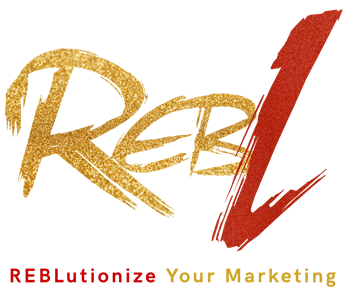Reb Risty: Hi I’m Reb Risty, Head REBL at REBL Marketing, and I’m here today with Aron Bohlig. We’re going to talk about his business, how they heavily rely on referrals, and actually, they only accept referrals for business. Aaron, how are you?
Aron Bohlig: Hey Reb, great. How are you doing?
Reb Risty: Good, good. Thank you so much for joining me today. I know you’re busy traveling the world and I’m excited to talk to you because one of the things that attracted me to want to interview you, was what you have on your website, and it clearly states that you only accept referrals. And I thought that’s a bold statement and that you do this, so you’re actually saving on marketing effort and budget, which is an interesting message. Well, really quick tell me a little bit about who you are what you do.
Aron Bohlig: Absolutely, very happy to. So, I’m Eric Bolling, the Founder and Managing Partner here at ComCapp LLC. ComCapp is a boutique investment bank that’s focused on retail e-commerce. We help companies generally valued between 30 and 300 million, to either raise money or to sell themselves or in some cases help larger companies to buy new companies – that are in new product categories or new geographies for them.
Aron Bohlig: For us referrals have been really the cornerstone of our business in many cases. We are approached by new potential clients but I’d say probably, nine times out of ten, somebody as a referral is both more qualified, more likely to become a client, more likely to be an interesting prospect for us, an economic opportunity for us that kind of a blind person from outside of my network. And that’s really been a central tenet of how I’ve built the business over the last seven years, has been to expand my network and really take pride that we asked for referrals. In terms of marketing, other marketing activities, the key activity we use is content marketing. So, we try to be a thought leader in our space. We try to take a position on sometimes provocative questions. We publish lots of research on our websites. As you noted I was just traveling to Hong Kong where I was presenting at a conference about the impact that Amazon and Alibaba having retailers around the world and really positioned ourselves. As I said, as kind of thought leaders and as unique domain experts. And so that’s led itself well to our referral marketing program because, generally if we ask somebody to introduce a friend, they’re making out who’s a CEO or board member, who would be eligible for services by being positioned as an expert in our field. Generally, they’re very happy to do so. So, we find that a combination of the two things content marketing and that kind of working referral network are kind of a virtuous cycle. Some of the other marketing activities we’ve pursued over time. We do, we have tried kind of outbound campaigns especially bringing on new business development team first. And usually frankly those are just less effective in many cases the folks that we’re trying to reach out to are CEOs. They have well-established networks. So, unless we have a relationship perhaps through a board member or some member of their executive team, it’s frankly, it’s very tough to kind of come into the front door through a cold calling approach. So that’s just kind of reinforced activities related both for marketing and then to content marketing.
Reb Risty: Okay, that’s great, and I think that’s something that a lot of businesses, especially in the marketing and I know you talked to other professional services that kind of get caught up in this whole digital age and you get to drive leads and they forget their business really built on relationships. In fact, that’s how you and I met was an Entrepreneurs Organization event, and here we are you know staying connected. Who knows if we’ll ever do business together, but I think building that network and having that personality and friendship before you even talk about business is so important. So, what are – if you had some advice – there’s so many opportunities to network, how do you decide and choose? How have you made that work for you?
Aron Bohlig: Well that’s a great question. Certainly, something that’s been kind of trial and error over time. Usually, I try to focus on events with only kind of the right level of participants in my case as I’ve mentioned. Generally, we’re seeking to pitch to CEOs and board members. And so, the good news is you always know who the CEO is a company because he or she is going to make sure his or her name and bios on that company website. So, it’s fairly easy to find the right person and then it’s really a function of kind of finding the events that really are curated to go to exactly that audience. And so we tend to go to fewer kind of general industry events and only select ones where I know the right level of attendees is going to be there. And so, we’re fairly selective in terms of how we spend time with different industry events. Because in many cases it’s not some decision-maker. It just frankly not worthwhile spending time tracking network.
Reb Risty: Yeah, and I find when I’ve gone out my tactics and they maybe a little more random. But you pretty, you know pretty quickly when you attend an event. If you’re going to find the right audience or not, great. Well the other thing you mention is content and that’s something that we work on as well for our clients. Tell me a little bit. How do you decide or strategize around the content that you are going to give?
Aron Bohlig: Well it’s a great question. We do it through a couple of different vehicles. One is just in conversation our clients and other people in the industry going to be both speaking at events and I’m going to major events. We kind of usually summarize a conference and talk about the top three to five trends that speaker, other speakers and address at that conference and over time we’ll look at those trends and see if there’s an area that we should put energy into researching especially if it’s something that’s not covered by one of the major industry analysts in our field.
Aaron Blake: Gardner Forester and others are fairly active, but they don’t cover new emerging technology segments. So we tend to focus on those areas. The other area we look for is funding activity. If we see a lot of venture capital funding going into a new area that does not have established competitors. And that suggests that in two or three years those small companies will grow into medium-sized in some cases larger companies. And so we’ll seek to get ahead of that trend research space and establish ourselves experts in that new evolving category.
Reb Risty: Okay, yeah. That makes a lot of sense. So, are you, yourself producing it, is your team producing it? Are you doing mostly articles? Can you tell us a little bit about the content?
Aron Bohlig: Yeah. We primarily do between 20- and 70-page reports with one or two these putting out a month. I write everything myself. Every word, every image is painstakingly crafted by myself. No, I’m joking.
Reb Risty: I was going to say that’s impossible unless you’re superhuman.
Aron Bohlig: I dedicate my ability elsewhere. We’ve got an editor in chief manages the production process and generally our frontline client-facing professionals of producing core content. These are people that are working in management consulting capacity basically with very large companies around the globe. We think generally we have a very unique point of view, and in many cases, the feedback we’ve gotten is that the work we do is is better than maybe the traditional industry analysts out there.
Reb Risty: That’s great. Do you also, if somebody new who has been referred to you, do they comment or mention, you know the content of the articles that they read or something that really encouraged them to follow up with you?
Aron Bohlig: Very frequently yes. In many cases it maybe we’ve started to have a relationship with somebody that we didn’t even know about because they’ve started reading our content, or they may have seen a conference presentation a year and a half before we had a first conversation. That’s where they were kind of getting to know our brand and the quality for that we produce. And then, finally, a relevant topic comes up and they’ve reached out or otherwise we’ve connected in some fashion but where we’ve really laid out a lot of pitting something, so to speak over time through this content we’ve been producing.
Reb Risty: Okay great. Well thanks Aaron. Any last thoughts on content or just marketing in general that you like to share with my audience?
Aron Bohlig: Yeah, I guess in general I’d like to say I’d rather have 10 percent of the people love me than some of the people not care. What that means is generally we do make a strong point of view suggests that other small professionals you’re better off speaking the truth to something you really know a lot about as opposed to being generic or vague or being overly expansive in covering topics that somebody else might do a better job than you would. So triple down on your strengths and be the best professionally you can, I think, guess that’s my takeaway.
Reb Risty: Great thank you. I second that and agree. Well Eric, if someone did want to get a hold of you or read your content what would be the best way for them to do that?
Aron Bohlig: Well certainly they’re welcome to visit our website at Comcast. We’ll see, if they’re a friend of yours happy to take that call. Referrals are always welcome, as you know. They’re also welcome to contact me directly, aron@comcapllc.com
Reb Risty: Thanks Aaron. I look forward to talking to you again.
Aron Bohlig: That’s great. Thanks, so much Reb. Have a good day.
Reb Risty: You too.




